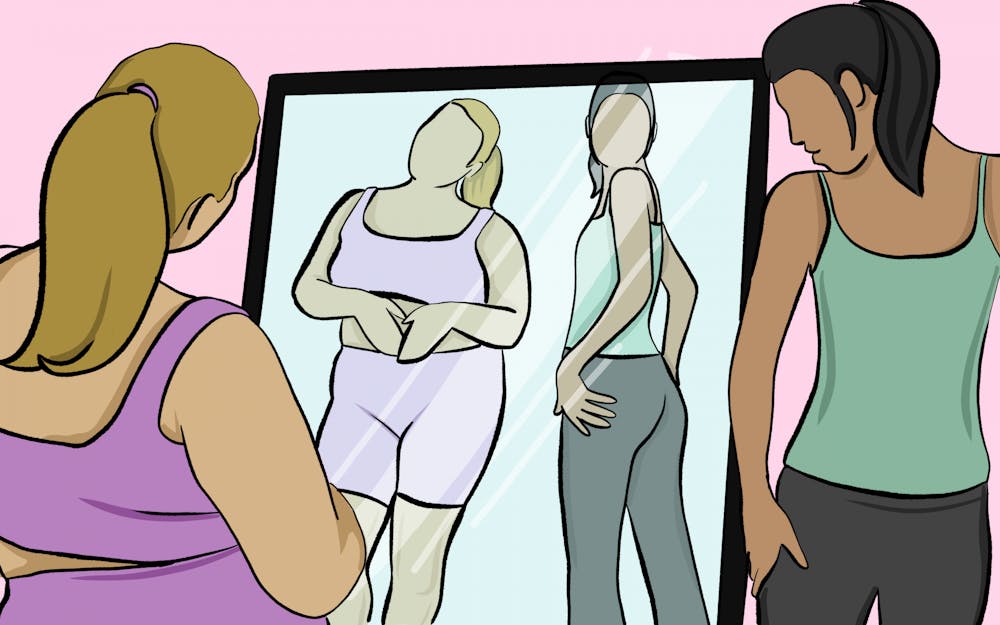When I was in middle school and started to care about my perceived beauty, the Kardashians were the first people I would think of when I thought of conventional beauty. I remember seeing Kylie Jenner and Kim Kardashian's perfect curves in all the right places and thinking that is what bodies had to look like to be considered beautiful.
For as long as I can remember, the “slim thick” figure was what was desired. But recently, we have seen a resurgence of the “heroin chic” body standard. The term heroin chic has a very dark history and is simply not something we should aspire to.
Heroin chic was coined after the wunderkind photographer Davide Sorrenti overdosed on heroin. Heroin chic is a look that is extremely thin and emaciated. The term was used in the 1990s to describe supermodels such as Kate Moss and Gia Carangi.
This term was especially insensitive at the time, as the opioid crisis and the AIDS epidemic were both happening during this era. In fact, Gia Carangi was a heroin user who passed away due to AIDS complications. To romanticize extreme thinness that was a result of drug abuse is extremely disgusting and unhealthy. And we are now, unfortunately, seeing history repeat itself with celebrities taking extreme measures to obtain thinness.
[Related: COLUMN: How upcycling helped fix my body dysmorphia]
Remember the perfect slim thick figure of Kim Kardashian? Well, Kardashian has decided to go all in on the heroin chic look. This transition started when Kardashian reportedly went on an extreme weight loss diet to lose 16 pounds in three weeks to fit into Marilyn Monroe’s “Happy Birthday, Mr. President” dress for the 2022 Met Gala. She also broke out with psoriasis during this diet. Her extreme and dangerous methods to achieve thinness send a harmful message to her wide and impressionable audience.
With this, the public has noticed that Kim’s iconic curves have started to disappear. She appeared on “The Late Late Show with James Corden” with a noticeably smaller chest. She has also reportedly stopped getting her Brazilian butt lift topped off.
There is also a new drug suspected of helping celebrities obtain weight loss: Ozempic. Ozempic is a drug that is used by type 2 diabetics to lower blood sugar and A1C levels. It is not by any means supposed to be used by non-diabetics for weight loss.
Last fall, Elon Musk tweeted that he was using Wegovy, a weight loss medication meant for people with weight-related conditions like type 2 diabetes, in order to achieve weight loss himself. A month before, Andy Cohen tweeted “Everyone is suddenly showing up 25 pounds lighter. What happens when they stop taking #Ozempic ?????”
This hype is one of the reasons that there is a shortage of diabetes drugs in the U.S. Diabetics who rely on that medicine to regulate their blood sugar are suffering at the hands of this new wave of heroin chic.
So, what do I make of this situation?
Firstly, bodies going in and out of style is problematic in and of itself. We need to promote healthy lifestyle choices as opposed to a body aesthetic, and weight is not always equivalent to health. Abusing drugs and going on extreme diets is proof that skinny does not automatically equal healthy.
[Related: OPINION: Generation Z has the best and worst body image issues of any other generation]
This false perception of what the average body looks like is detrimental to the mental health of the public at large. And seeing people on social media with their bodies perfectly posed can lead to body image issues.
The Mental Health Foundation conducted a study with 1,118 teenagers to ask them about body image. The results showed that four in 10 teenagers said images on social media had caused them to worry about body image.
Furthermore, 35% of teenagers dieted or stopped eating because they were worried about their body image often or every day, and 37% of teenagers felt upset and ashamed about their body image.
The foundation also states that “higher body dissatisfaction is associated with a poorer quality of life, psychological distress and the risk of unhealthy eating behaviors and eating disorders.”
Don’t let the resurgence of the heroin chic body type make you feel like your body is inferior in comparison. Everybody deserves to feel confident in their own body without aspiring to a number on the scale or a measurement around the waist.
Ravana Gumm (she/her) is a freshman studying journalism.






